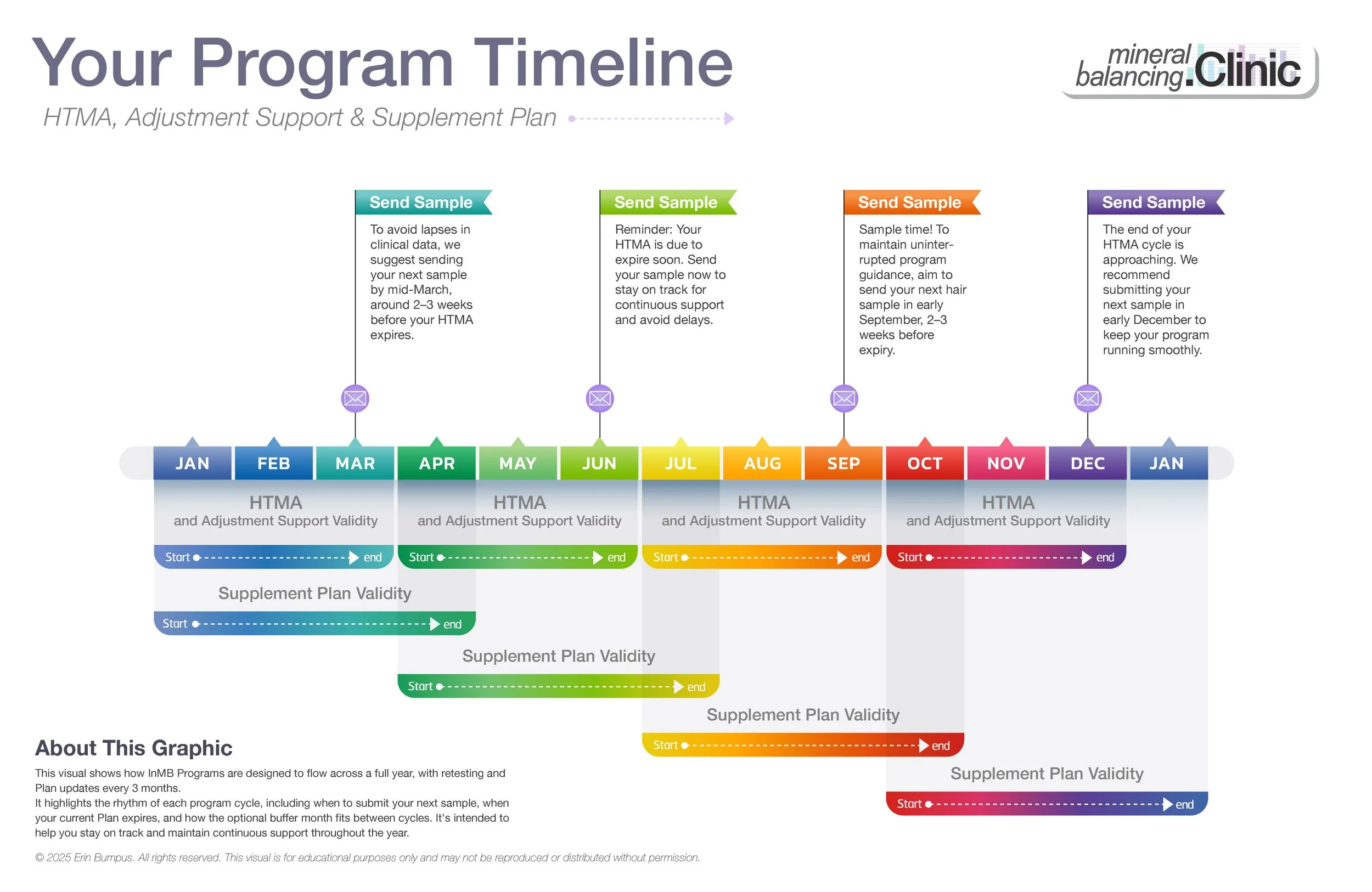How the Programs Work Over Time
Many people arrive with years of testing behind them, including blood work, functional labs, and supplement protocols, yet still feel unsure about what their body needs.
The InMB approach is different. It isn’t based on isolated results or one-off consultations. It follows a clear rhythm over time, using repeat HTMA testing to observe how your system adapts and to guide targeted adjustments along the way.
This page explains how your care unfolds across time: how the first year is structured, how things shift once you’re established, and why the timing of each Program Cycle matters.
Where You Are in Your Journey
Every InMB Program follows the same structure: one HTMA, one consultation, a personalised InMB Plan, and a defined support period. These cycles repeat - forming the stepping stones of your longer-term journey with John.
Foundational Clients
The first year of your journey
Your journey begins with a 90-minute Initial Consultation. This session allows John to understand your history, system load, stress patterns, and priorities before arranging your first HTMA.
From there, your care continues through a series of Program Cycles, completed at reasonable intervals (usually every 3–4 months) to maintain continuity in your mineral timeline.
This phase is called the Foundational Phase because it establishes the patterns John works from — how your system shifts, how it responds, and what remains consistent over time. These early cycles provide the clarity needed for long-term direction.
Established Clients
Long-term care with John
After the Foundational Phase, you’ll move into Periodical Programs. These cycles follow the same core structure but may include:
Shorter consultation times
Longer expiry windows
More flexible timing, set by John
At this stage, the rhythm of your care is guided by your system’s needs rather than a structured first-year framework.
John sets the timing for each new cycle based on your individual presentation — ensuring your care remains specific, adaptive, and clinically relevant over time.
What Comes After Periodical Care
Behind the scenes, we’re actively building the next layer of support. While periodical programs are how we currently continue care, they may not be the final step for every client. We’re developing public education on mineralbalancing.org and laying the groundwork for longer-term options.
Learn more about the future direction of client care on this page.
Visual Overview: Timelines & Buffers
These diagrams help explain how your HTMA, consultation, and Plan fit together — and how long each phase lasts.
First-Year Program Overview
Shows how your first year typically unfolds across four cycles.
This visual is designed to help new clients understand the full structure of a foundational year.
If you're an established client, your cycle may differ slightly depending on your testing rhythm, though the overall structure remains consistent.
Click image to enlarge
Program Cycle Example – Typical 3-Month HTMA Validity
This visual represents the most common structure for newer clients.
If you're an established client on a 4/5 month cycle, your expiry timing will simply include an extra month between cycles.
John will note your expiry dates directly on your Supplement Plan.
Click image to enlarge
Understanding Your Program Cycle
Your Program includes two expiry periods: one for clinical support (based on HTMA data) and one for how long your Supplement Plan is suggested to follow.
-

HTMA Results – Valid for 3 Months
This is because your body chemistry changes over time, and older data may no longer reflect your current mineral status. This period is used for clinical interpretation and adjustment support.
If you’re an established client on a 4–5 month cycle, a longer timeframe may be noted directly on your Plan.
-

Supplement Plan – Valid for 4 Months
Your Supplement Plan is valid for an additional month after the expiry date of your HTMA. This timeframe includes a 1-month overlap window, designed to give you time to submit your next sample, attend an online consultation, and order supplements before your Plan expires.
For established clients with a longer testing cycle, John may note an extended validity period on your Plan.
-

When Adjustment Support Ends
Adjustment Support applies only to your current Supplement Plan and is available only while your HTMA is valid. Once your HTMA expires, no further support or changes can be made to that Plan.
If you require clinical support after your current HTMA has expired but before your next Program begins, a follow-up consultation may be more appropriate.







